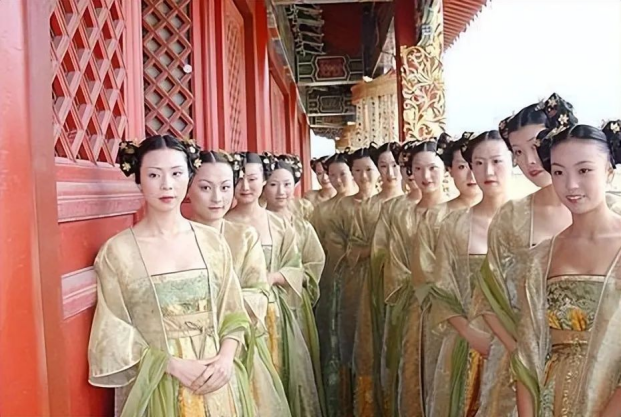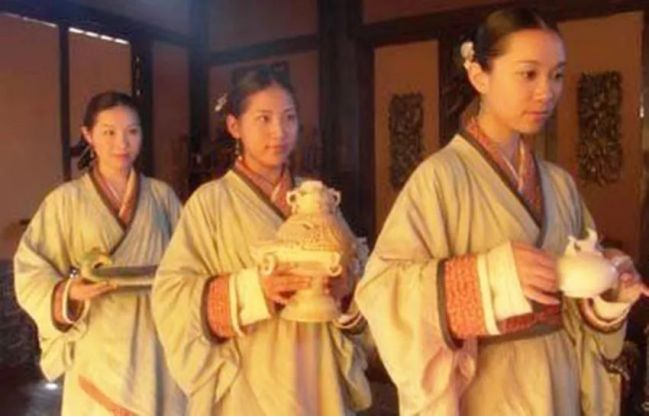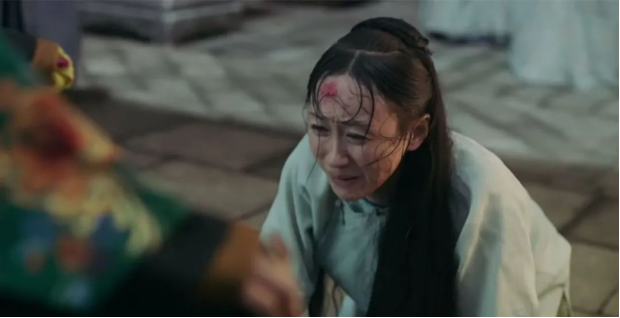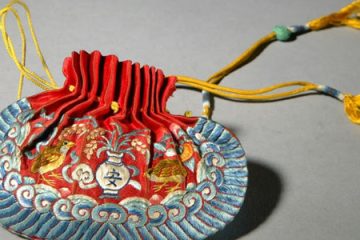Want to Be an Ancient Chinese Palace Maid? Read This First

In TV shows and movies, the images of palace maids are often depicted in various colorful ways. There are stories of palace maids winning the favor of emperors with their fresh and refined beauty, and legends of them pleasing their masters with their wit and liveliness. Dressed in gorgeous Chinese traditional clothing, they shuttle among the carved beams and painted rafters, serving the emperor and concubines. These plots make people can’t help but fantasize about traveling through time and space to write a glorious chapter of rising to power in the palace as a palace maid. However, the truth of history is often more complex and cruel than artistic embellishments. The lives of palace maids were far from as glamorous as shown on the screen. Instead, they were filled with bitterness and hardship.
Ⅰ. A Luxurious Cage
“Once entering the deep palace, one sees no spring year after year.” The imperial palace, this magnificent center of power, is both a symbol of honor and the entrance to an abyss for countless women. Behind the luxurious lives of the royal family and noble relatives is a huge service system, and palace maids are an essential part of it. Once they enter the palace, they are basically cut off from the outside world for the rest of their lives and can no longer see their family and friends. What’s even worse, in the strictly hierarchical imperial palace, palace maids have no human rights at all. They live carefully every day, for fear that a mistake will bring about fatal consequences.
From the daily life of their masters to the complicated affairs of the court, palace maids silently take on everything and become an indispensable part of palace life. However, the process of selecting palace maids is full of helplessness and cruelty. From the plundering of war prisoners in ancient times to the civilian – based talent selection in the Han Dynasty, and in the Qing Dynasty, the selection of palace maids was closely linked to the fate of the family. If an eligible girl evaded the selection, her whole family might be implicated and severely punished.

They have to spend long years in the deep and large palace courtyards, from their youth to old age with white hair. Perhaps only a very small number of them are fortunate enough to be favored by the emperor and promoted to concubines. The vast majority of palace maids can only work hard in obscurity until they are too old and weak to be released from the palace. Even when they leave the palace, they have already missed the best age for marriage and it’s difficult to find a good match. Even more tragic is that palace maids also have to face the cruel fate of being buried alive as sacrifices. Once the emperor or a high – ranking concubine dies, the palace maids who serve them closely may become victims of the sacrifice. For example, Guo Ai, a palace maid of Emperor Xuanzong of the Ming Dynasty, Zhu Zhanji(朱瞻基), was only 14 years old. Just over 20 days after she entered the palace, Zhu Zhanji passed away. According to the rules, she had to be buried alive as a sacrifice. “The palace gate is as deep as the sea once entered.” This is not only a vivid description of the living situations of palace maids but also a profound sigh about their ill – fated destinies.
Ⅱ. Extremely Difficult Path to Promotion
When it comes to the promotion of palace maids, many people may think of the common scenes in TV dramas: a beautiful little palace maid is favored by the emperor or a prince and thus rises to the top overnight, becoming a noble mistress and enjoying wealth and honor from then on. However, such plots are mostly fictional artistic embellishments. The real – life promotion path for palace maids in history is far from that simple. Although there are a few cases of palace maids being promoted after being favored by the emperor for their beauty, they are extremely rare. In most cases, even if a palace maid is fortunate enough to be visited by the emperor, the improvement of her status is extremely limited. She is often only given the low – status title of “guan nü zi (官女子, means you are a woman with an official position)”, and still has to continue to do heavy work, with only a slight improvement in living conditions. What’s more, due to her humble origin, she may be despised by the emperor.

Even if she is pregnant with the emperor’s child, she may not receive due treatment and respect. For example, Empress Dowager Wang (王恭妃) of Wanli Emperor (明神宗), Zhu Yijun (朱翊钧), was a palace maid who was favored by the emperor and became pregnant. Empress Dowager Li, in order to give her grandson a legitimate status, asked Zhu Yijun to confer the title of Concubine Wang Gong on this palace maid. Even though she later gave birth to a son, her own fate did not change much. On the contrary, because she was not valued by the emperor, she was bullied by other favored concubines and deliberately ignored by the emperor. She and her son were separated for many years. Eventually, the mother and son were able to meet, but by then Concubine Wang Gong had already gone blind and soon passed away full of resentment.

Apart from relying on beauty and the emperor’s favor, are there any other promotion channels for palace maids? Yes, but they are equally difficult. There is a strict hierarchical system among palace maids. From the head nannies, senior palace maids, ordinary serving palace maids, to the lowest – level palace maids who do laundry and clean chamber pots, a strict pyramid – shaped structure is formed. To stand out from the bottom, one not only needs to make great efforts but also has to have good opportunities and excellent social skills. In this process, palace maids must always be cautious, avoiding making mistakes or offending important people. At the same time, they also need to continuously improve their skills and qualities to be able to stand out in the fierce competition. Since only a very small number of people can successfully reach the top, they have to compete intensively. Those who can’t keep up with the competition have to accept their fate. In other words, the promotion path for palace maids is not as easy and wonderful as depicted in TV dramas. This path is full of hardships and challenges, and requires palace maids to make great efforts and sacrifices.

Ⅲ. Strenuous Work and Inadequate Rest
Deep within the ancient imperial palaces, palace maids silently took on all aspects of the life in the inner court. From the food, clothing, shelter, and transportation of their masters to their entertainment, every bit was filled with their hard work and sweat. Embroidery, a job that required great patience and delicate skills, became a part of the daily lives of palace maids. By the dim light of candles, they stitched intricate patterns, thread by thread. Spending long hours using their eyes caused many palace maids to suffer from vision problems, and some even went blind. Pouring tea, which seemed simple on the surface, actually required them to always pay attention to their masters’ needs. They had to prepare tea at the right temperature in advance, and even a small mistake could lead to punishment. Standing guard at night was an even greater test of the physical and mental strength of palace maids. In the stillness of the night, they had to stay highly alert, lighting incense, fanning, and giving massages until their masters fell asleep peacefully. To fight off drowsiness, they had to resort to extreme measures, such as putting cocklebur in their shoes and using the pain to refresh themselves. And those palace maids with outstanding talents also had to perform songs and dances for their masters at night to entertain them, not to mention their arduous rehearsals on a daily basis.

However, after such heavy labor, the rest conditions for palace maids were extremely poor. Their food was simple and coarse, hardly meeting their basic nutritional needs, and they didn’t even dare to dream of delicious delicacies. In order to avoid body odor and frequent trips to the toilet, they had to strictly control their diet and dared not eat foods with strong flavors or high water content. All aspects of their lives served their work, and their diet was no exception. Their living conditions were also extremely shabby. In the narrow side rooms, palace maids crowded together on large communal beds, with no privacy at all. When sleeping, to avoid offending the “Palace God (Feudal rulers believed they were sent by heaven to rule the world and were blessed by the gods. They thought that if palace maids slept on their backs, it would offend the gods that safeguarded the emperor. This was seen as capable of influencing the emperor’s good luck and even the destiny of the nation. The so – called “Palace God” here generally refers to those gods that were believed to protect the emperor. )”, they were not allowed to sleep on their backs but had to sleep on their sides, keep their legs tightly together, and were not allowed to burp or pass gas. These strict requirements for sleeping postures made it difficult for them to truly relax even when they were exhausted.
Even more tragic was that when palace maids fell ill, they couldn’t get timely medical treatment. The rules in the palace were very strict. Women below the rank of concubines were not allowed to invite male doctors to diagnose and treat them when they were sick. In most cases, palace maids could only endure their illnesses, and they still had to continue working while they were sick.

Ⅳ. Punishments and Lack of Dignity
It was common for palace maids to be punished. During the Qing Dynasty, the punishments for palace maids ranged from reciting the teachings for women to physical punishments and even more brutal penalties, all demonstrating their low status and the hardships of their existence. “Carrying the Bell (提铃)” was a unique form of punishment. The punished palace maids had to carry a bell in their hands and walk through every corner of the inner court, shouting “天下太平 (Peace under Heaven)” regardless of wind or rain. After one round, the palace maids were often exhausted, their voices hoarse, and both physically and mentally drained. The “Banzhu Punishment” was even more terrifying. The palace maids had to stand with straight legs and bend over, touching their feet with their hands, and maintain this position for the time it took to burn several sticks of incense. Maintaining this posture for a long time not only caused excruciating physical pain but also easily led to cerebral congestion, dizziness, and vertigo. One can imagine the intense suffering. However, being punished was just one part of a palace maid’s life. They were also the targets for their masters to vent their emotions. A slight mistake could lead to scolding or even physical punishment.
Not just palace maids, the strict hierarchical system made everyone extremely cautious. In the TV series Empresses in the Palace, we saw Nian Shilan (年世兰) give Xia Dongchun (夏冬春), a newly – entered palace maid, the “yi zhang hong” punishment. What is the “yi zhang hong (一丈红)”? “The ‘yi zhang hong’ is a punishment in the palace. A wooden board, two inches thick and five feet long, is used to beat the area below the waist until the bones and muscles are broken and the flesh is a bloody mess. From a distance, it looks like a large patch of bright red, so it’s called ‘yi zhang hong’!” The color of the red hollyhock is really similar to dark red blood. It makes one not dare to look at this kind of flower closely ever since.


In the imperial palace, palace maids were nothing more than an endless supply of low – level and marginalized tools, always being the most severely oppressed by this feudal system. What’s more, as recorded in Biographies of Tyrannical Officials in the New Book of Tang (《新唐书·酷吏传》), palace maids were used as tools for extorting confessions and were tortured with cruel punishments like bamboo clamps, and the scenes were extremely tragic. The story of Li Fengniang of the Southern Song Dynasty cutting off the hands of a palace maid out of jealousy pushed the tragic fate of palace maids to the extreme. In the game of power, palace maids were merely pawns, and their lives, deaths, honors, and humiliations were completely in the hands of their masters.
Apart from physical torture, palace maids also suffered severe trampling on their emotions and dignity. To prevent palace maids from being favored by the emperor and giving birth to imperial children, their masters would subject them to the cruel punishment of “cloistering”, depriving them of the right to bear children. Few of them could survive this punishment. And the so – called “romantic partnerships” with eunuchs, although providing a psychological sustenance for palace maids in some ways, were mostly accompanied by more pain and suffering, because many eunuchs had extremely abnormal mental states due to their physical disabilities.
Palace maids didn’t even receive a decent burial after death. In the imperial palace, they were regarded as expendable items, and no one cared about their lives and deaths. Many palace maids were driven out of the palace gates when they were seriously ill or too old and weak, left to wander the streets with no one to claim their bodies. Even for those who died in the palace, their funerals were often extremely simple. Some were even casually buried in the wilderness, turning into the dust of history.
Summary
When we are immersed in the illusory palace world created by film and television works, we should not forget the pain and sacrifices endured by those real – life palace maids. Decked out in servant – style traditional Chinese dress, they were the victims of feudal society. Their days were filled with endless toil, using the tragedies of their entire lives to expose the evils of the feudal system.
Fortunately, we are now living in a new society. Women are no longer restricted only to the domestic sphere and can more freely choose the lives they want to lead. So, if anyone says they want to time – travel back to ancient times to be a palace maid, just tell them to give up that idea. The probability of being noticed by the emperor and reaching the pinnacle of life is lower than the odds of winning the lottery when you go downstairs to buy a ticket.




0 Comments